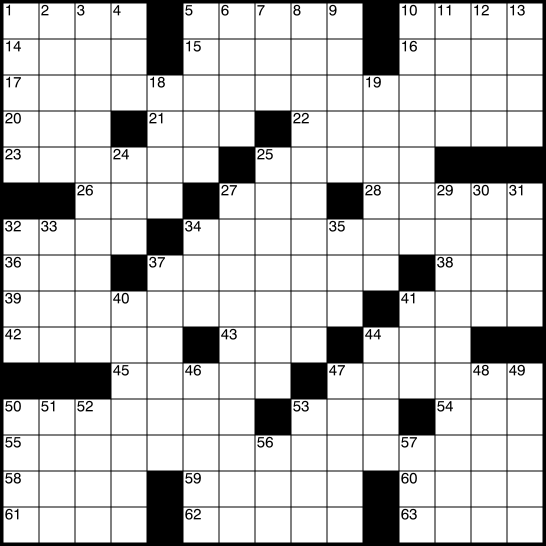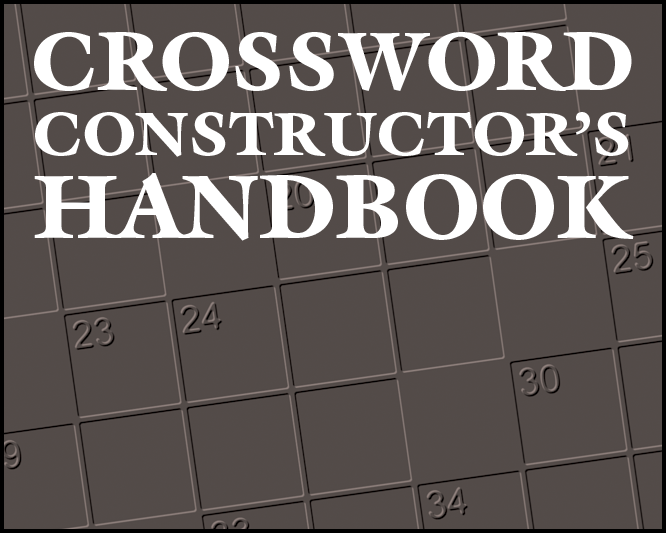Focus | Grid Size & Format | Constructors? |
Rules, Conventions | Apps, Dictionaries, Tools | References
 Focus
Focus
- My introductory CROSSWORDS and YOU course focused on solving crosswords,
via lecture and group practice; it also highlighted history, showed where to find puzzles,
and briefly & broadly covered authoring (constructing). - This course focuses on constructing crosswords
-- appreciating nuances of themes, grids, fill and clues may help you become a better solver.
Wanting to construct your own puzzles is not a pre-requisite. - What other differences in coverage or approach?

via Wikimedia Commons
Attribution-Share Alike 3.0 Unported
Grid Size & Format
- There many possible word puzzle sizes, layouts, languages:
CROSSWORDS and YOU: Terminology & Types. - The focus in this course: American, themed daily crosswords, e.g., NYT Mon-Thu.
- American newspaper-style, fully-crossed*, symmetric grids [on right]:
e.g., New York Times (NYT) Los Angeles Times (LAT),
Universal (Mail Tribune), Wall Street Journal (WSJ), etc.
-- not vocabulary-style, free-form, criss-cross word puzzles [top right],
or British-style cryptics [below right];
*aka 'fully-checked': each answer square has both an Across and Down clue, i.e., no 1-letter words (usually)  themed: e.g., NYT:Mon-Thu, Sun
themed: e.g., NYT:Mon-Thu, Sun
-- not NYT:Fri-Sat (themeless; hardest! What Makes a Good Themeless Puzzle?)- 15 x 15 size: e.g., NYT:Mon-Sat -- not NYT:mini 5 x 5 [on right] or NYT:Sun 21 x 21
-

British-style grid by MeekMark,
public domain
via Wikimedia CommonsNote: NYT Sun 21 x 21 ranks in difficulty like ~Wed/Thu NYT
-- though solving takes longer (~2x more squares: 441 vs. 225);
constructing larger grids is more challenging: more theme entries, even higher quality fill & clues, etc. - "A 78-word 15x15 typically has an average word length of ~4.8-5.0 letters?
A 72-word 15x15 themeless is probably around 5.5-5.6 letters
and a 140-word 21x21 themed is often like 5.3" ~Evan Birnholz on Crosscord(Discord)
Who Can Be A Constructor?
- In the past, typically old white guys. ;-)
- Now (increasingly), anyone with great ideas, new perspective -- and the right skills/tools.
- Will Shortz: "In the 90s, my sense is that the average age of constructors
[who submitted puzzles] was in the early 50s. Now it’s in the mid-30s." - What's come of this trend is a positive feedback loop of young constructors
attracting young solvers who in turn become young constructors. - The catalysts for this are many: the ease of access to puzzles online;
- software that makes puzzle construction more fun and less daunting;
- an increase in social networking and collaboration among both setters
and solvers (as on XWordInfo.com and Cruciverb.com); - Deb Amlen’s Wordplay column, whose goal is to "help those intimidated
by the NYT crossword get over their fear of the puzzle." - even the rise of diverse, indie crossword communities all over the country
focused on those historically underrepresented in puzzledom
-- the LGBTQ+ community, female constructors, and people of color. - source: Smithsonian: How Crosswords Came of Age in the 2010s
Rules / Conventions
- When creating free-form or crossword puzzles for yourself or friends,
you can choose any words, grid size, layout, clues, etc. - The focus in this course: follow the 'rules' that solvers & publishers expect, e.g., symmetry, word choice, ...:
- Publisher Specs/Submission Guidelines: NYT, LAT, Univ., WSJ, etc.
- Cruciverb.com: basic rules
- NYT: How to Make a Crossword Puzzle: The Series: Parts 1-5
- Wikipedia: NYT: Style and conventions
- XWordInfo.com
- Margaret Farrar: Contributions and Accomplishments
- "Learn the rules...
- Rules can sometimes be broken -- there's more latitude with an exceptional puzzle and a great justification.
- Following the rules doesn't guarantee a good crossword, e.g., The World's Worst Crossword
- We'll cover many of these conventions in upcoming sections: Themes; Grid; Fill; Clues; Publish
Apps / Dictionaries / Tools
- CROSSWORDS and YOU: Authoring surveyed methods used by constructors:
- paper: e.g., WordPlay documentary
- web sites/apps: e.g., Armored Penguin (free-form only); Crosserville, Crosshare, PuzzleMe
- applications: e.g., CrossFire, Crossword Compiler
- The focus in this course: CrossFire application, with add-on dictionaries
to construct 15 x 15 themed crosswords, with in-depth examples. - next sections: Overview of Process; Tools; Formats

References
- How a Crossword Puzzle Gets Made video: 3:32; Mike Vuolo; Slate; 11/12/2014
- NYT: How to Make a Crossword Puzzle: The Series
Part 1: Theme; 2: Grid; 3: Fill; 4: Clues; 5: Publish; Resources - Crossword Constructor's Handbook by Patrick Berry; $10; e-book (.pdf) 89 pp.,
plus 70 sample puzzles; originally published as Crossword Puzzle Challenges for Dummies, 2004 - The Art of Crossword Construction William Johnston; .pdf; 7pp.; free; 1/26/2010
- How Crossword Puzzles Are Really Made Matt Gaffney; MF; 9/10/2014
- Themed Puzzle Construction Christoper Adams; .pdf, 8 pp., free; puzzle, 2/2018
- Walkthrough: Making a Puzzle with CrossFire theme, grid, fill, clues, publish
- How-to videos (YouTube, Twitch): Erik Agard; Alex Boisvert (Crossword Nexus);
Will Eisenberg; Sid Sivakumar; Ross Trudeau and Amanda Rafkin; Brian Thomas;
Six-part video series from The New Yorker; Crossword Jargon Glossary - cruciverb: Crossword Constructors Community Center
- XWord Info: New York Times Crossword Answers and Insights
- Atlas Obscura: Creating Crossword Puzzles course; Brooke Husic & Natan Last; $70
- CROSSWORDS and YOU (course); Authoring: Introduction, References
